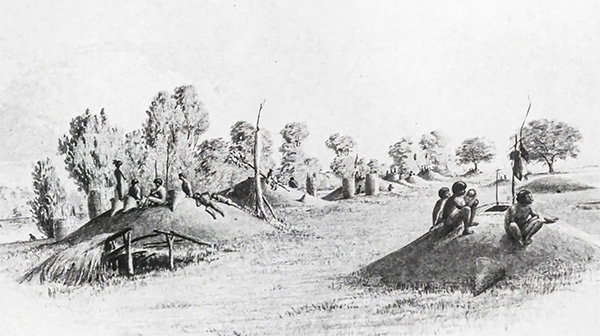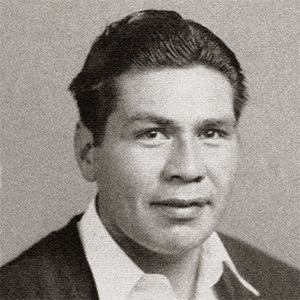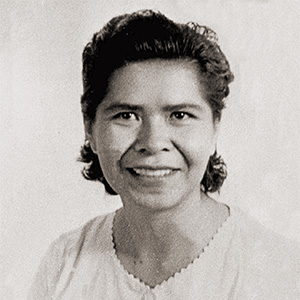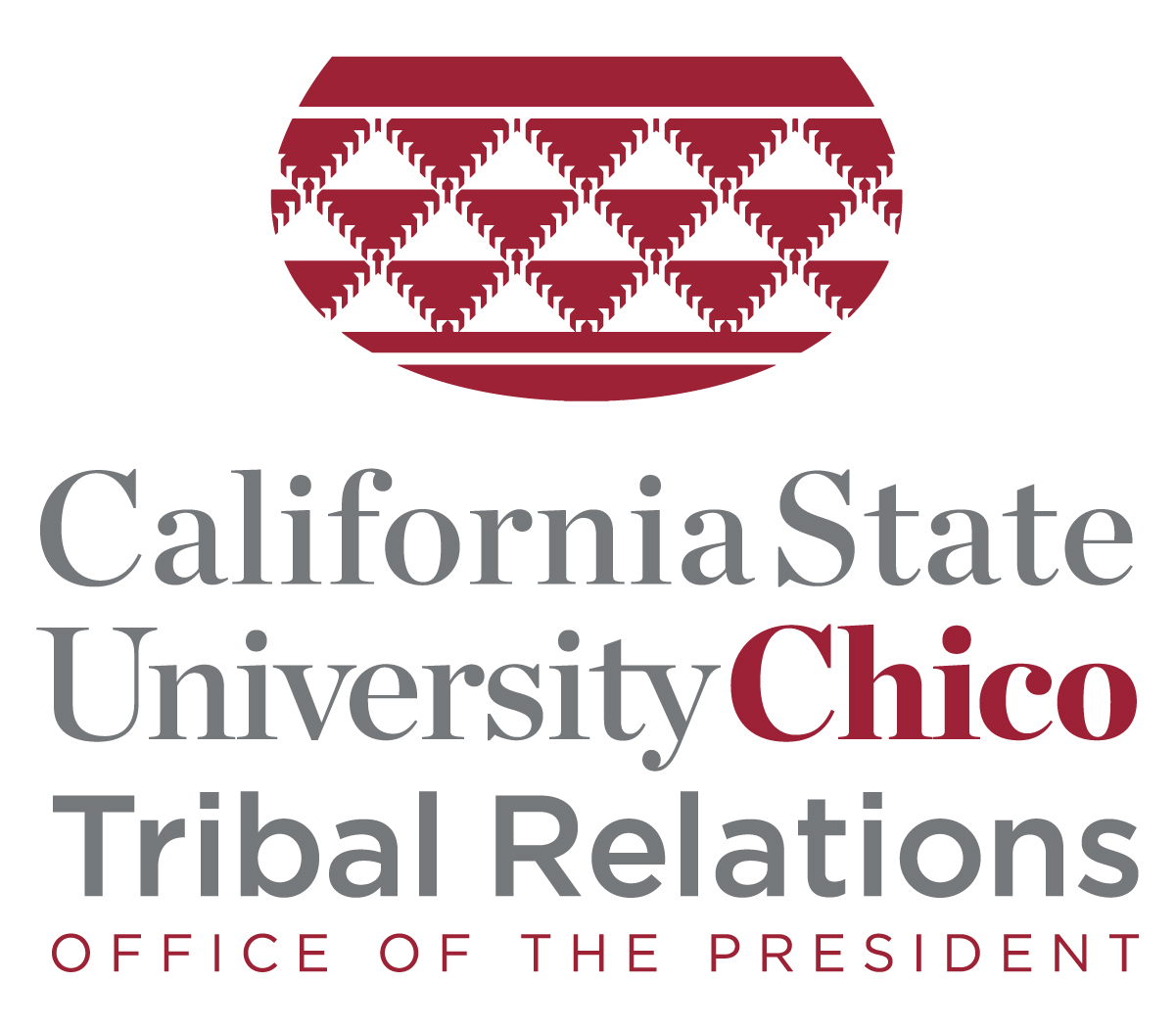Bahapki
In September 2021, a dedication was made to honor the Mechoopda people with an outdoor tribute and indoors exhibit at the Science Building. Alongside a stunning collection of local artifacts, we are honored to highlight the first Mechoopda graduates from our University and proudly display the names of all graduates from the Mechoopda Tribe. Their contribution to our institution and service to the community are a shining example of academic excellence and personal achievement.
About Bahapki
Bahapki was a Mechoopda village that sat on the banks of Big Chico Creek right where the campus stands today.
The village represents a pivotal time in Mechoopda history—at the time Bahapkiwas inhabited, over 75 percent of the tribe’s population had been lost due to the introduction of novel viruses to its people. The lifestyle they had lived for hundreds of years changed seemingly overnight as they were forced to adapt to new ways in order to survive.
Bahapki is a tribute to the sacrifices made by Mechoopda ancestors and an acknowledgement prayer said here for the people of the tribe to be in existence today.

Illustration credit: Henry B. Brown, fl. 1850-1859
Mechoopda Graduates | Chico State
- Carl Delgado (General Education, ’40)
- Thelma Wilson (Language Arts, ’55)
- John McHenry (Sociology, ’01)
- Dannielle Hostetler (Psychology, ’02)
- Beatrice Ward (Anthropology, ’04)
- Natalie Frost (Social Work, ’13; MSW, ’14)
- Steve Santos (Communication Design, ’13)
- Christina Harrison (Social Work, ’15; MSW, ’16)
- Anthony Tyler (Business Administration, ’18)
- Lianne Bertolucci (Nutrition and Food Sciences, ’19)
- He-Lo Ramirez (Biological Sciences, ’19)
Featured Graduates

Carl Delgado
Born in Chico April 10, 1912, Carl Delgado (General Education, ’40) attended Normal High School before enrolling at Chico Normal School in 1935 as a music major. He quickly found a home for his talents in the University band and a capella choir, but his interest in sports proved stronger and he changed his major to physical education.
With a passion for teaching and playing sports, he was a member of the varsity football team, boxing team, and track team; served as president of the honors athletics association Block C Society; and coached the freshman football team during his junior and senior years.
During the summer, Delgado worked in the almond and prune orchards to earn money for tuition, while also teaching driver’s education and private music lessons. He was a member of Delta Psi Delta, elected Sheriff at Pioneer Days in 1938, and served in the Associated Students.
After graduating in 1940 with his degree in general elementary education, Delgado served as a teacher, coach, and education administrator for over 25 years in Covelo, Round Valley, and Lower Lake—where the high school gymnasium bears his name today.
After many years of coaching football and other sports teams to regional and state championships, he left public education and took an administrative position with the federally sponsored Northern California Indian Education Program, where he coordinated grants and directed in-service curriculum specialties for Mendocino, Humboldt, Shasta, and Del Norte Counties.
Throughout his life, Delgado wanted to ensure Native American students had as much training and education as possible to advance their social mobility. He eventually traveled around the country to visit and learn about other tribes, and promoted education for Native American people.
He died August 23, 1974, supporting the education of Native students until his final days. Beloved by all who knew him and a stranger to no one, Delgado was a proud member of the Masons of California and the Chico State Alumni Association. In 1987, he was inducted posthumously into the Chico State Athletics Hall of Fame and honored as part of the Chico State Team of the Century in football.
His legacy lives on in all of his former students and players, and within his grandchildren and family members.

Thelma Wilson
Born June 26, 1930, in Janesville, Thelma Wilson (Language Arts, ’55; Credential, ’64) moved to Chico with her family when she was six years old to be closer to the Mechoopda tribe and have greater job opportunities. Her parents’ education was limited, and she enthusiastically attended local elementary schools and Chico High School.
With an insatiable appetite for learning and especially reading, Wilson dreamed of becoming a teacher one day. She relished extracurricular classes like speech, and would go home and share with her family all that she learned in school.
She paid her way through college doing various jobs, from picking fruit to housework. At times, it was difficult to afford tuition but she was determined to finish her education, not only for herself but to show other Native youth what was possible.
An outspoken student, she earned good grades and began to take on the role of educator by telling her faculty and peers about Mechoopda culture. She earned her bachelor’s degree in language arts in 1955 and her teaching credential in 1964.
After graduation, she fulfilled her dream of being a teacher, working at schools near Weaverville and in Madera, teaching English at the elementary, junior high, and high school levels. In her free time, she tutored children in Gridley and within the Tribe, to ensure they too would have every chance for educational success and hopefully develop a similar lifelong love of learning. She also studied at the National Autonomous University of Mexico, in Mexico City, and served as executive director of the Friendship House in Chico.
Throughout her life, Wilson sought to share the Mechoopda story with anyone and everyone. She gave many public presentations on her ancestors, Mechoopda language pronunciation, basketry, and traditional food preparation, as well as the US Calvary’s atrocious treatment of Native Americans during their forced migration along the Nome Cult Trail. Of particular pride was the fact that her aunt, Maggie Sowillenno, was a friend of Annie Bidwell and is whom the street between Holt Hall and Bidwell Mansion is named.
She never married but feels a deep fondness for her nieces, nephews, and extended family, as well as the hundreds of students she taught during her time as an educator.
She remains an active member of the Mechoopda Tribe, regaling friends and family with stories of her childhood and family history, and encouraging younger generations to break stereotypes and earn a college degree by following their interests and not giving in to distractions or any deterrents.

